Alumni Spotlight: Cynthia Franklin, M.S.
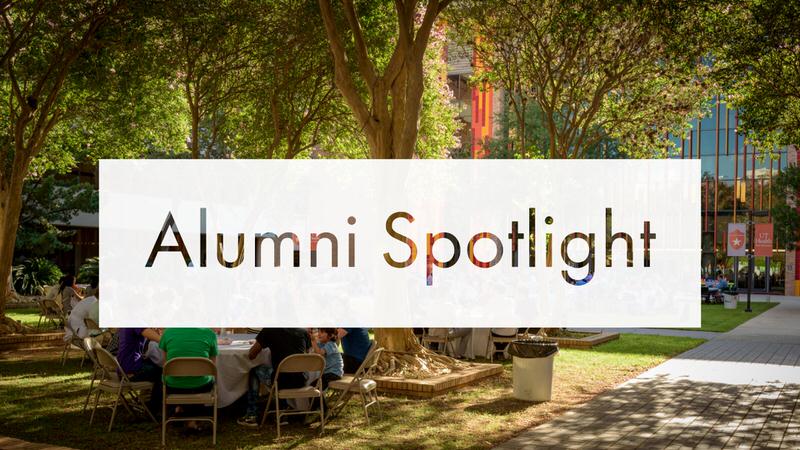
1) When did you first become interested in science?
I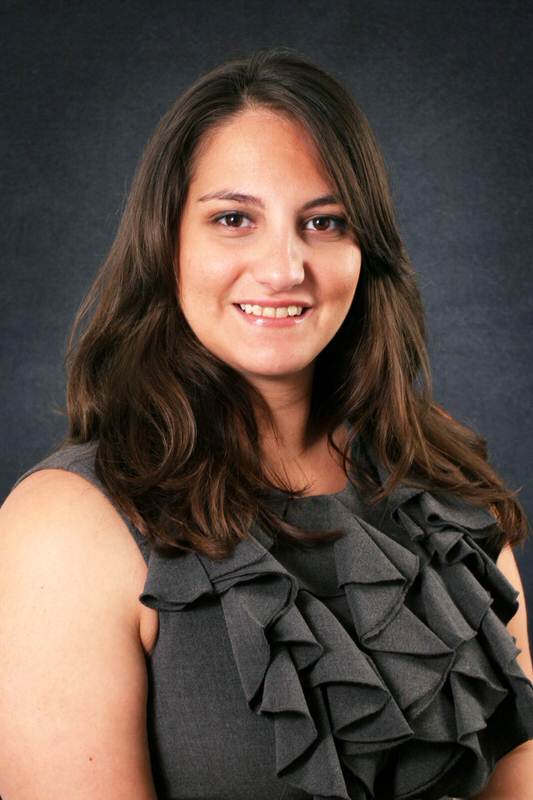 first became interested in science during my freshman year at Northwest Vista Community College. I wanted to start a career in communications. During this time, working in the field I was majoring in was a must. Next thing I knew I was working for Y100 radio station aspiring to becoming a news anchor. Gaining experience in the field quickly made me realize there were other possibilities out there, ones that I would be better suited for. During my time at community college I elected to take an Anatomy and Physiology I class with Dr. Irene Chapa (Office of Recruitment and Science Outreach, at UT Health San Antonio). That was when I identified my passion for science and truly fell in love with the field. With my new realization or “ah ha” moment behind me, I felt relieved, yet eager, to push on. Anatomy and Physiology II, also taught by Dr. Chapa, was next. During this semester, Dr. Chapa announced that a colleague of hers had a job opening for a research assistant and recommended I apply. A few months later I found myself working for Dr. Carmen Hinojosa-Laborde in the Department of Anesthesiology at UT Health San Antonio. While gaining an astronomical amount of experience under Dr. Hinojosa-Laborde, I obtained my undergraduate Biology degree from The University of Texas at San Antonio (UTSA). This is the point in time in which I truly consider to be the starting point of my research career. After my undergrad, I continued my education in research and obtained my masters from UT Health San Antonio with a Master of Science degree in Clinical Investigation (MSCI).
first became interested in science during my freshman year at Northwest Vista Community College. I wanted to start a career in communications. During this time, working in the field I was majoring in was a must. Next thing I knew I was working for Y100 radio station aspiring to becoming a news anchor. Gaining experience in the field quickly made me realize there were other possibilities out there, ones that I would be better suited for. During my time at community college I elected to take an Anatomy and Physiology I class with Dr. Irene Chapa (Office of Recruitment and Science Outreach, at UT Health San Antonio). That was when I identified my passion for science and truly fell in love with the field. With my new realization or “ah ha” moment behind me, I felt relieved, yet eager, to push on. Anatomy and Physiology II, also taught by Dr. Chapa, was next. During this semester, Dr. Chapa announced that a colleague of hers had a job opening for a research assistant and recommended I apply. A few months later I found myself working for Dr. Carmen Hinojosa-Laborde in the Department of Anesthesiology at UT Health San Antonio. While gaining an astronomical amount of experience under Dr. Hinojosa-Laborde, I obtained my undergraduate Biology degree from The University of Texas at San Antonio (UTSA). This is the point in time in which I truly consider to be the starting point of my research career. After my undergrad, I continued my education in research and obtained my masters from UT Health San Antonio with a Master of Science degree in Clinical Investigation (MSCI).
2) Why did you pick The University of Texas Health Science Center at San Antonio and your program?
I picked UT Health San Antonio’s Master of Science in Clinical Investigation program for a couple of reasons. First, I wanted to get familiar with clinical research. I had done a lot of bench research, and animal research, but my long-term goal is to work with the clinical applications of research. Second, during the five years working at UT Health San Antonio, I quickly realized the students attending there were highly passionate about their time there. Their dedication was evident and I fully understood how much obtaining a degree from UT Health San Antonio meant to them. This “spirit” quickly rubbed off on me. With the anesthesiology department offering to pay partial tuition, I soon found myself attending class again. My time as a student, research assistant and new mother during this time was only possible in part by the flexibility of the class schedules available to me.
3) Tell me more about your career path.
I worked as a Lab Technician III, in the Department of Anesthesiology, at UTHealth from 2005-2008. After that, I was a Senior Research Assistant in the same department until 2012. Around the same time, from 2009, I also started working in the Department of Pharmaceutical Sciences at the University of the Incarnate Word as a Senior Research Associate. This is where I am at present.
4) Tell me about your current career, what do you do?
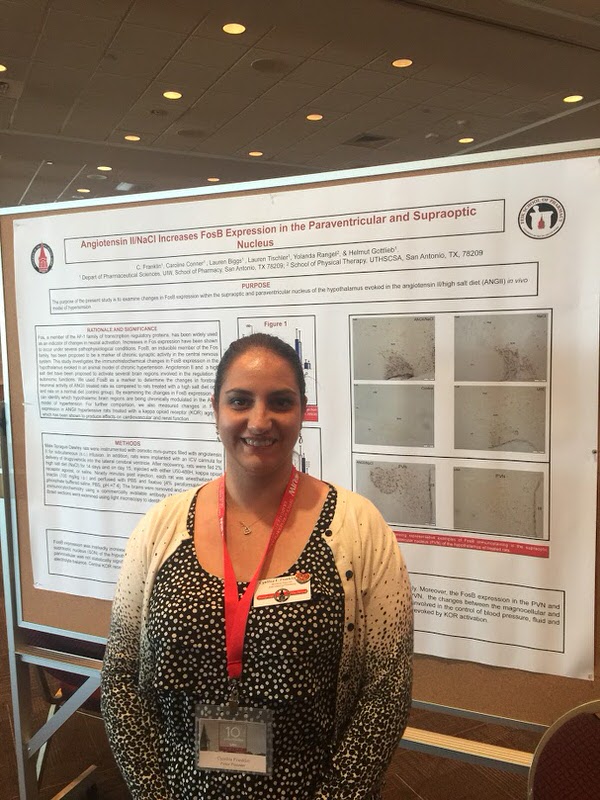 I currently work for the University of the Incarnate Word (UIW) at the Feik School of Pharmacy (FSOP) as Senior Research Associate in the Department of Pharmaceutical Sciences. I have made significant contributions to the project plan, design, implementation, coordination, and analysis of specific aspects of projects. My duties involve research, operating lab equipment, ordering lab supplies and equipment for the FSOP internal grant, performing experimental procedures, as well as collecting, interpreting, and summarizing research data. The research experiments and techniques I use to assure high quality results and complete analysis include: animal brain tissue processing; immunohistochemistry, western blots, gel preparation/staining, Intracerebroventricular (ICV) cannula implantation, renal nerve recording, animal handling, lyophilization, cell/tissue culture, thin layer chromatography (TLC), solvent evaporation, chemical reactions, mass spectrometry, circular dichroism, fluorescence spectroscopy, SDS-Page, protein dialysis, UV spectroscopy assays, slide mounting, buckle swab spin kit assay, flash chromatography, and high-performance liquid chromatography. In addition, I compile data and prepare results for presentations at meetings and conferences, as well as for papers submitted for publication. Also, during the summer and winter semester, I assist and supervise student workers/volunteers with their research projects. During the fall semester, I assist in the preparation, and teaching of experiments for an elective course- “Research Methods In Pharmaceutical Sciences.”
I currently work for the University of the Incarnate Word (UIW) at the Feik School of Pharmacy (FSOP) as Senior Research Associate in the Department of Pharmaceutical Sciences. I have made significant contributions to the project plan, design, implementation, coordination, and analysis of specific aspects of projects. My duties involve research, operating lab equipment, ordering lab supplies and equipment for the FSOP internal grant, performing experimental procedures, as well as collecting, interpreting, and summarizing research data. The research experiments and techniques I use to assure high quality results and complete analysis include: animal brain tissue processing; immunohistochemistry, western blots, gel preparation/staining, Intracerebroventricular (ICV) cannula implantation, renal nerve recording, animal handling, lyophilization, cell/tissue culture, thin layer chromatography (TLC), solvent evaporation, chemical reactions, mass spectrometry, circular dichroism, fluorescence spectroscopy, SDS-Page, protein dialysis, UV spectroscopy assays, slide mounting, buckle swab spin kit assay, flash chromatography, and high-performance liquid chromatography. In addition, I compile data and prepare results for presentations at meetings and conferences, as well as for papers submitted for publication. Also, during the summer and winter semester, I assist and supervise student workers/volunteers with their research projects. During the fall semester, I assist in the preparation, and teaching of experiments for an elective course- “Research Methods In Pharmaceutical Sciences.”
5) What is a day like in your job?
My position is a unique position here at UIW. I currently work with several PI’s in several 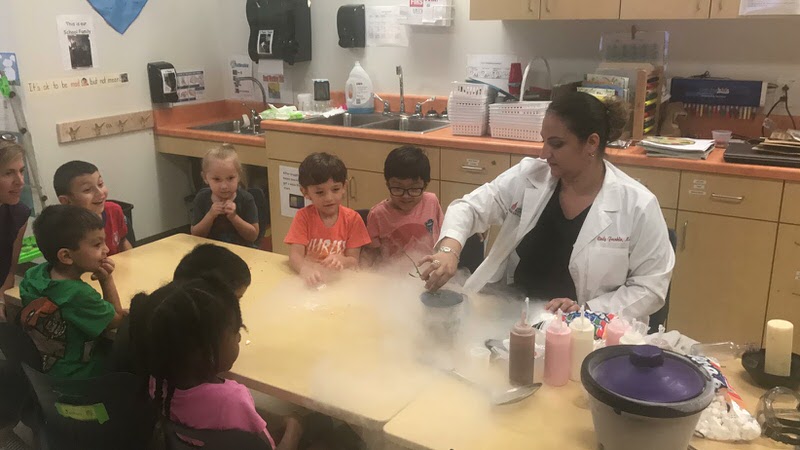 different divisions of science. So it really depends on the day. I could be doing research in biology, pharmacology, biochemistry, medicinal chemistry, organic chemistry, pharmaceutics and neurology. During the spring and fall, research is slower than usual due to classes being in session. So I generally data crunch and do as much reading as possible. I also assist in teaching a lab during the fall semester. The summers are quite intensive in terms of research. We also encourage students to join the lab, and I help teach and supervise some of the experiments during the summer.
different divisions of science. So it really depends on the day. I could be doing research in biology, pharmacology, biochemistry, medicinal chemistry, organic chemistry, pharmaceutics and neurology. During the spring and fall, research is slower than usual due to classes being in session. So I generally data crunch and do as much reading as possible. I also assist in teaching a lab during the fall semester. The summers are quite intensive in terms of research. We also encourage students to join the lab, and I help teach and supervise some of the experiments during the summer.
6) How did the education you get at The University of Texas Health Science Center at San Antonio prepare you?
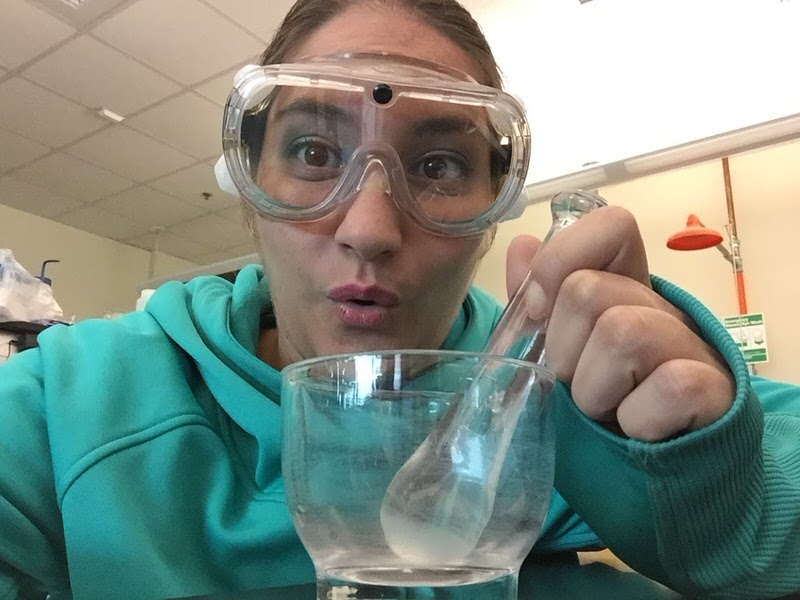 My education at UT Health San Antonio prepared me to look at research from various points of view. My knowledge of bench research and how it can translate directly to clinical research definitely developed while at UT Health San Antonio. I became proficient in grant writing as well as learning the differences between Institutional Animal Care and Use Committee (IACUC) and Institutional Review Board (IRB) and how to effectively fill out the protocols. My classmates came from different walks of life including clinical surgeons, nurses, Ph.D.’s, and graduate students. Working alongside, I gained a deeper understanding of ways to approach problem solving and abilities to learn new concepts as well as adapt to different walks of life. This all translated down into the research career I was slowly building.
My education at UT Health San Antonio prepared me to look at research from various points of view. My knowledge of bench research and how it can translate directly to clinical research definitely developed while at UT Health San Antonio. I became proficient in grant writing as well as learning the differences between Institutional Animal Care and Use Committee (IACUC) and Institutional Review Board (IRB) and how to effectively fill out the protocols. My classmates came from different walks of life including clinical surgeons, nurses, Ph.D.’s, and graduate students. Working alongside, I gained a deeper understanding of ways to approach problem solving and abilities to learn new concepts as well as adapt to different walks of life. This all translated down into the research career I was slowly building.
7) What is the most challenging part of your work?
The most challenging part of my work is scheduling and producing research and data for private investigators that have completely different backgrounds. Although I absorb and conduct a variety of experiments with high-quality work, I am not able to completely explain the in-depth concepts about why we are doing a certain experiment. In order to fully understand each experiment, you have to read. While I love to read about different research designs and papers, there is just not enough time in the world to fully understand the private investigators’ knowledge in the field. This, along with conducting my own personal research, definitely proves daunting at times but is well worth it.
8) What is the most rewarding part of your work?
The most rewarding part of my job is being able to help with multiple PI’s research. Knowing that I can learn a variety of subjects and experiments has really taught me there is so much you can do in research. I really like being able to give my input on a subject that I am not familiar with and get feedback, as well as actually being heard and validated.
9) What has been your proudest 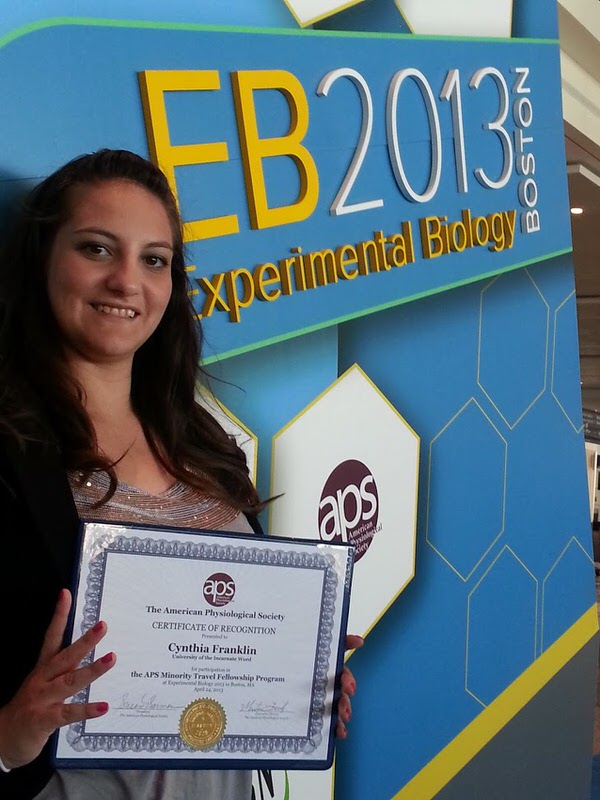 achievement?
achievement?
My proudest achievement recently is applying and getting approved to receive an internal grant from the Feik School of Pharmacy to do some research on cannabidiol (CBD). Another achievement was obtaining the 2013 APS Minority Travel Fellowship Award to go to Experimental Biology in Boston. I’m also proud of my publications which I’ve listed a few below.
Selected Peer-Review Publications
Kelli A Herrlinger, MS; Teresa A Craig; Cynthia E Mehring-Franklin; Zoraida DeFreitas,Ph.D; Carmen Hinojosa-Laborde, Ph.D.(2013) Anthiypertensive effects of passion fruit peel extract and its major bioactive components following acute supplementation in spontaneously hypertensive rats. Ms. N.:JNB-11-568R2. Journal of Nutritional Biochemistry
Cynthia Franklin, MS; Lourdes Fortepiani, Ph.D; Tin Nguyen, BS; Yolanda Rangel Ph.D; Randy Strong, Ph.D; Helmut B. Gottlieb Ph.D (2015) Renal responses produced by microinjection of the kappa opioid receptor agonist, U50-488H, into sites within the rat lamina terminalis. DOI: 10.1002/prp2.117 Pharmacology Research & Perspectives
Alexandra E. Soto-Piña, Cynthia Franklin, C.S. Sheela Rani, Helmut Gottlieb, Carmen Hinojosa-Laborde and Randy Strong. (2016) A novel model of Dexamethasone-induced hypertension: Use in investigating the role of tyrosine hydroxylase. DOI: 10.1124/jpet.116.234005. JPET #234005
R.A. Bellanger, S. Ramsinghani, C. Franklin, C. Seeger (2016) Safety of Complementary and Alternative Medicine (CAM) Treatments and Practices. SIDE EFFECTS OF DRUGS ANNUAL VOLUME 38 A worldwide yearly survey of new data in adverse drug reactions. Elsevier Radarweg 29, PO Box 211, 1000 AE Amsterdam, Netherlands The Boulevard, Langford Lane, Kidlington, Oxford OX5 1GB, United Kingdom 50 Hampshire Street, 5th Floor, Cambridge, MA 02139, United States First edition 2016 Copyright © 2016 Elsevier B.V. All rights reserved
Isaac Garza, Miranda J. Wallace, Dinesh Fernando, Aman Singh, Richard E. Lee, Jason S. Gerding, Cynthia Franklin, and Raghunandan Yendapally (2017) Synthesis and Evaluation of Thiazolidine Amide and N-Thiazolyl Amide Fluoroquinolone Derivatives. Arch. Pharm. Chem. Life Sci. 2017, 350, e1700029
10) What would you tell a current student interested in your career? Any advice?
My first advice is that you really need to love science and read a lot to be interested in research. If you are not passionate about what you do, then you need to find something you really enjoy. You have to always want to learn more techniques and be very careful and precise in your everyday work.
Research is what I love, so getting my Ph.D. was not a priority, especially since I did not want teaching to be my main priority. Collaboration and networking is the key to getting new ideas and techniques. Always attend and be present at local or national meetings. Don’t be afraid to ask questions if you don’t understand something.
11) What do you like to do outside of work?
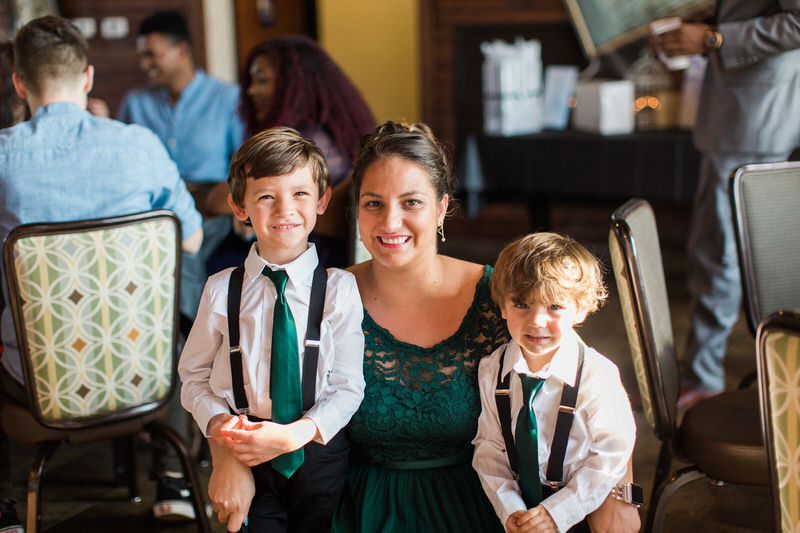 I have two wonderful boys, (I was pregnant and had both while I was doing my masters at UT Health San Antonio) and my husband of nine years that I love to spend my time with outside of work.
I have two wonderful boys, (I was pregnant and had both while I was doing my masters at UT Health San Antonio) and my husband of nine years that I love to spend my time with outside of work.
We love to do outdoor activities such as hiking, swimming, going to the movies, traveling, and playing sports. Every weekend is full of activities. There is never a dull moment caring for two young boys.
